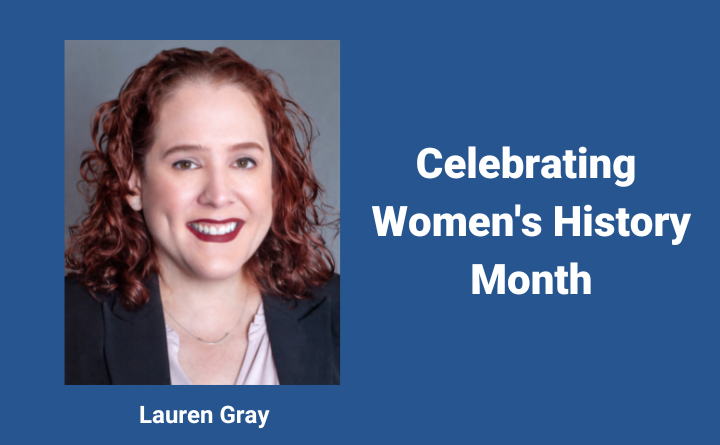Celebrating Women’s History Month: Meet Lauren Gray, Chief of Staff to the Chief Operating Officer
During Women’s History Month, we honor the contributions women have made and continue to make. From frontline staff at developments to executives in the central offices, women employees at NYCHA are leading the way in helping to improve and strengthen NYCHA.
We spoke with Lauren Gray, Chief of Staff to the Chief Operating Officer (COO), who provides direct support to the COO on various aspects of NYCHA’s operations and property management. She’s been in this role since January 2022 and has held numerous roles during her 10-year career at NYCHA. In her former position as Vice President of Compliance, she was charged with monitoring City, State, and federal regulations to ensure that NYCHA’s operational policies and procedures are up to date. She also previously worked for the NYC Department of Health and Mental Hygiene, where she helped oversee a team that coordinated agency-wide emergency preparedness planning, exercises and training, evaluation of incident responses, and exercise performance.
In our conversation, Ms. Gray discussed her role at NYCHA, the value of mentoring, and the importance of having more women in leadership roles.
What are you working on as Chief of Staff?
There are several special initiatives and projects that I’m currently working on, on behalf of the COO’s office. One project of significance to me is assisting homeless families move out of the New York City shelter system and into permanent, affordable housing, as well as moving current NYCHA residents who are in dire need of an emergency transfer. NYCHA has been given additional funding to move 2,283 families into apartments that are move-in ready and are environmentally safe from lead, mold, and asbestos. As of February 15, 2023, 1,287 fully renovated apartments have been rented to NYC Department of Homeless Services families and NYCHA emergency transfers. I look forward to completing this very important initiative over the next couple of months, and continuing to provide safe, affordable housing to New Yorkers.
What are you most proud of regarding your work at NYCHA?
If I’m able to resolve even just one issue a day for our residents, I can chalk that up as a win. That’s why I’m here. Yes, it’s a job, but if I’m not waking up every morning ready to serve our residents then I shouldn’t be working for NYCHA.
What has been the most important advice or guidance a mentor gave you?
No matter how busy you are, or where you are in life, you always have to be there for your mentees. I still go to my mentor to this day, and he’s been retired from City government for over 10 years. He offers me wonderful guidance and feedback, and I do the same for my mentees. Whether you’re working for me or not, my door is always open. My phone is always ready to take a call. My computer is up and running and I’m happy to respond to any emails. I’ve made that a point with all my staff. There have been a couple of employees I’ve mentored at NYCHA that are still working here, but they’re not working for me. As a mentor you need to be a force in someone’s life for their entire career, not just the time when they’re working for you.
On the flipside, what kind of advice do you have for women working at NYCHA who want to progress in their roles?
Have a very honest conversation with your supervisor and hopefully they will be welcoming and ready to assist you in a new career path. Before you have that conversation, do your research, explore what path/role you see for yourself, and make certain that you qualify based on your education and experience. Don’t approach your supervisor with, “I want to get promoted” just to get promoted. Have a real plan in place and be ready to discuss.
I’ve had staff who admitted to me that they weren’t happy in their current roles. I said, “What do you want to do? Tell me. Are you interested in doing policy work, data, or managing a program? Let me work with you and I will help guide you to find a new role and responsibility within the Authority.” I will then facilitate conversations with other executives and see where there’s a need, and hopefully transition that employee into a new role. There’s no ego here. I’m a very big proponent of not letting the talent walk out the door. I like knowing that someone smart and committed to NYCHA is still at the agency, doing something that they have a passion for, and I helped make that happen.
Why do you think it’s important to have more women leaders?
The stereotype is that “housing work” is predominantly managed and led by men. Women now have a powerful voice, a seat at the table, and it’s incredible that we’re breaking down those barriers and stereotypes.
Not everyone has to be a housing expert to do well at NYCHA. My background originally wasn’t in housing or public housing. I worked at the Department of Homeless Services as a data scientist and at the Department of Health and Mental Hygiene doing emergency management. If you’re smart, if you’re willing to learn, I think regardless of if you’re a man or a woman, you’ll do well here. But the fact that there are so many women executives at NYCHA for the first time ever is amazing and inspiring.







